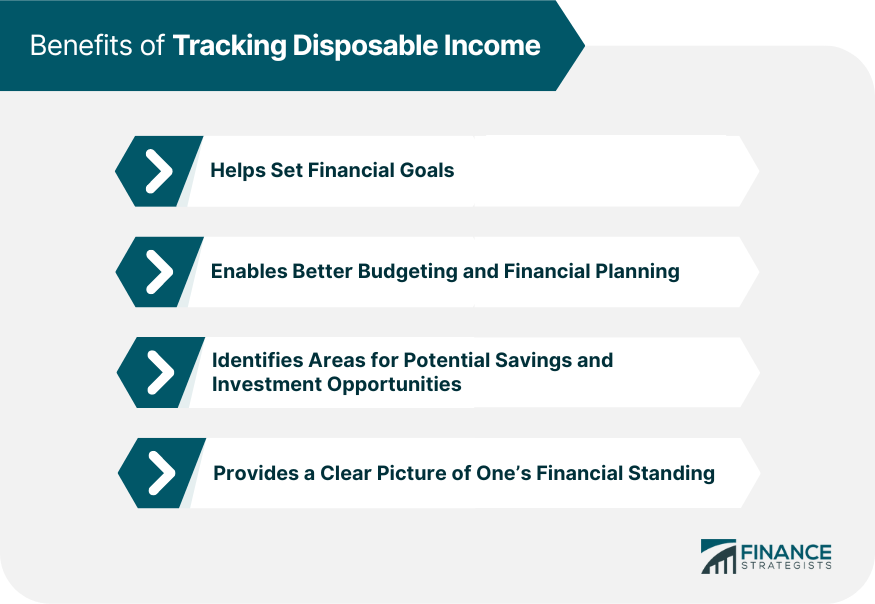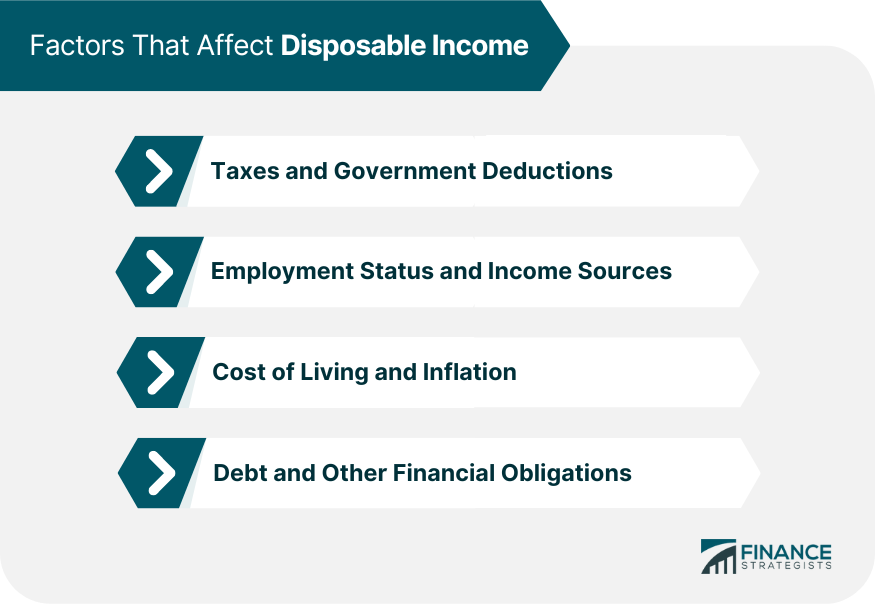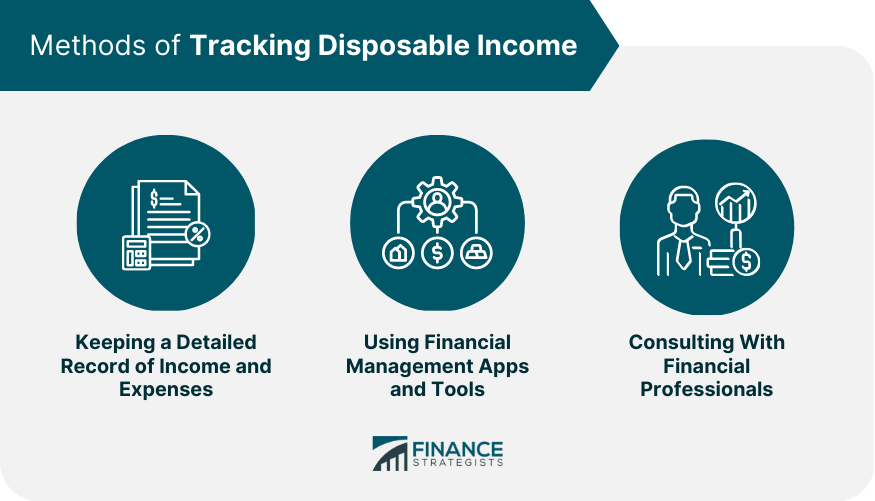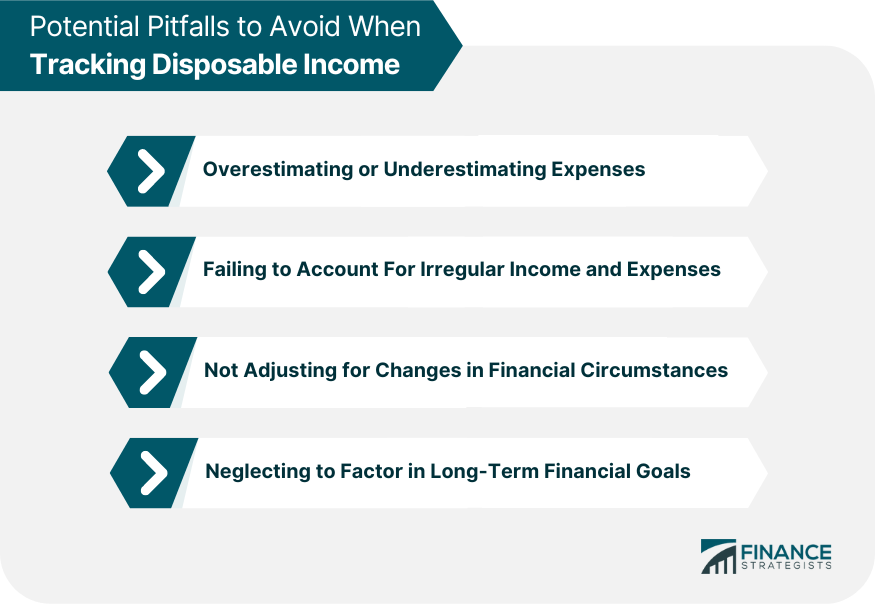Disposable income refers to the amount of money that an individual has left after deducting taxes, social security, and other mandatory deductions from their gross income. It is the money that is available for spending, saving, or investing. Understanding disposable income is important because it gives individuals a clear picture of their financial standing and helps them make informed financial decisions. Tracking disposable income can have a significant impact on an individual's financial health. The benefits of tracking disposable income include the following: One of the most significant benefits of tracking disposable income is that it helps individuals set achievable financial goals. By understanding their disposable income, individuals can determine what they can afford and what they need to save for to reach their financial objectives. This information is essential when planning significant purchases, such as buying a house or a car or retirement. Tracking disposable income helps individuals create a realistic budget and stick to it. This, in turn, helps individuals prioritize their expenses, avoid overspending, and plan for future expenses. With an accurate budget, individuals can avoid unnecessary expenses and ensure that they have enough money to cover their essential expenses, such as rent, food, and transportation. Tracking disposable income helps individuals identify areas where they can save money. By analyzing their spending habits, individuals can determine where they are overspending and where they can reduce expenses. This allows them to allocate and diversify their resources more effectively, save money, and invest in opportunities that align with their financial goals. Tracking disposable income gives individuals a clear understanding of their financial standing. By tracking income and expenses, individuals can determine if they are living within their means and if they have enough money to cover their essential expenses. This information is crucial when making important financial decisions, such as taking on new debt or investing in a new venture. Disposable income is affected by several factors, including: Taxes and other mandatory deductions, such as social security, can significantly affect disposable income. Individuals need to understand the taxes and deductions that apply to them to determine their disposable income accurately. Failure to do so can result in inaccurate financial planning and budgeting, leading to potential financial difficulties. Employment status and sources of income, such as salaries, bonuses, and commissions, can significantly impact disposable income. Individuals with more significant incomes have more disposable income than those with lower incomes. Additionally, individuals with multiple sources of income have a higher disposable income than those with only one source of income. The cost of living and inflation can significantly affect disposable income. A higher cost of living and inflation reduces the disposable income of individuals. In areas with high living costs, individuals may have less disposable income available to them, even if they have a high income. Debt payments and other financial obligations, such as child support, can affect disposable income. These payments reduce the amount of disposable income available for spending, saving, or investing. High levels of debt and financial obligations can lead to reduced disposable income and limit an individual's ability to achieve their financial goals. Tracking disposable income is crucial for individuals who want to manage their finances effectively. There are several methods of tracking disposable income, including: Individuals can track their disposable income by keeping a detailed record of their income and expenses. This includes tracking all sources of income and expenses such as rent, utilities, and other bills. This method allows individuals to have a clear picture of their income and expenses, making it easier to create a budget and identify areas for potential savings. Many financial management apps and tools are available to help individuals track their disposable income. These tools allow individuals to manage their finances easily and efficiently. They offer features such as expense tracking, budgeting, and investment tracking, making it easier for individuals to manage their finances and make informed financial decisions. Individuals can consult with financial professionals, such as accountants and financial planners, to help them track their disposable income. These professionals can offer guidance and advice on managing finances and making informed financial decisions. They can also help individuals create a budget, set financial goals, and identify investment opportunities that align with their financial objectives. While tracking disposable income can bring numerous benefits, there are also potential pitfalls that individuals should avoid. These pitfalls include: One of individuals' most common mistakes when tracking disposable income is overestimating or underestimating their expenses. Failing to track expenses accurately can lead to inaccurate financial planning and budgeting, making it difficult to achieve financial goals. To avoid this pitfall, individuals must track all their expenses meticulously and regularly review their spending. Irregular income and expenses, such as bonuses, tax refunds, and unexpected expenses, can impact disposable income. Failing to account for these fluctuations can lead to inaccurate financial planning and budgeting. To avoid this pitfall, individuals need to factor in all sources of income and expenses when tracking disposable income. Financial circumstances change over time, such as a change in income, expenses, or debt. Failing to adjust for these changes can result in inaccurate financial planning and budgeting. To avoid this pitfall, individuals need to review their income and expenses regularly and adjust their budget and financial plan accordingly. Long-term financial goals, such as saving for retirement or buying a house, require careful planning and budgeting. Neglecting to factor in these goals can result in poor financial planning and decision-making. To avoid this pitfall, individuals need to consider their long-term financial goals when tracking disposable income and make adjustments to their budget and financial plan accordingly. Tracking disposable income is essential for individuals who want to manage their finances effectively. By understanding their disposable income, individuals can make informed financial decisions, create a realistic budget, prioritize expenses, avoid overspending, and plan for future expenses. Factors that affect disposable income, such as taxes, income sources, cost of living, and debt, should be considered when tracking disposable income. By avoiding potential pitfalls such as overestimating or underestimating expenses, not accounting for irregular income and expenses, failing to adjust for changes in financial circumstances, and neglecting to factor in long-term financial goals, individuals can achieve their financial objectives and improve their overall financial health. Individuals can use various methods to track disposable income, such as keeping a detailed record of income and expenses, using financial management apps and tools, and consulting with financial professionals. Seeking the guidance of a financial advisor can be especially helpful for individuals who are new to tracking their disposable income or need additional support in achieving their financial goals.What Is a Disposable Income?
Why Is It Important to Track Disposable Income?

Helps Set Financial Goals
Enables Better Budgeting and Financial Planning
Identifies Areas for Potential Savings and Investment Opportunities
Provides a Clear Picture of One’s Financial Standing
Factors That Affect Disposable Income
Taxes and Government Deductions
Employment Status and Income Sources
Cost of Living and Inflation
Debt and Other Financial Obligations

Methods of Tracking Disposable Income

Keeping a Detailed Record of Income and Expenses
Using Financial Management Apps and Tools
Consulting With Financial Professionals
Potential Pitfalls to Avoid When Tracking Disposable Income

Overestimating or Underestimating Expenses
Failing to Account For Irregular Income and Expenses
Not Adjusting for Changes in Financial Circumstances
Neglecting to Factor in Long-Term Financial Goals
The Bottom Line
Importance of Tracking Disposable Income FAQs
Tracking disposable income is important because it gives individuals a clear understanding of how much money they have left after taxes and other mandatory deductions. This information helps individuals make informed financial decisions and set achievable financial goals.
Tracking disposable income provides several benefits, including helping individuals set financial goals, enabling better budgeting and financial planning, identifying areas for potential savings and investment opportunities, and providing a clear picture of one's financial standing.
Disposable income is affected by several factors, including taxes and government deductions, employment status and income sources, cost of living and inflation, and debt and other financial obligations.
Individuals can track their disposable income by keeping a detailed record of income and expenses, using financial management apps and tools, or consulting with financial professionals such as accountants and financial planners.
Pitfalls to avoid when tracking disposable income include overestimating or underestimating expenses, failing to account for irregular income and expenses, not adjusting for changes in financial circumstances, and neglecting to factor in long-term financial goals.
True Tamplin is a published author, public speaker, CEO of UpDigital, and founder of Finance Strategists.
True is a Certified Educator in Personal Finance (CEPF®), author of The Handy Financial Ratios Guide, a member of the Society for Advancing Business Editing and Writing, contributes to his financial education site, Finance Strategists, and has spoken to various financial communities such as the CFA Institute, as well as university students like his Alma mater, Biola University, where he received a bachelor of science in business and data analytics.
To learn more about True, visit his personal website or view his author profiles on Amazon, Nasdaq and Forbes.















